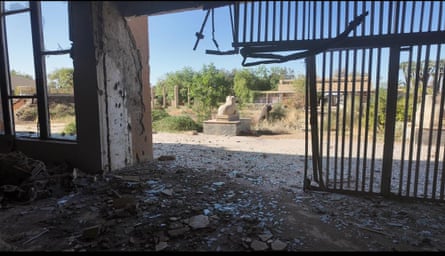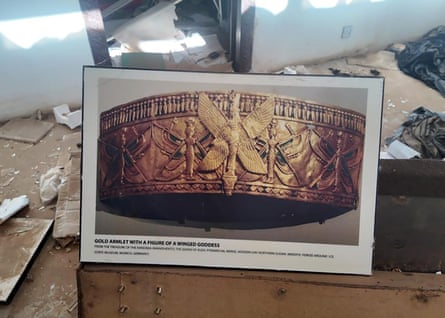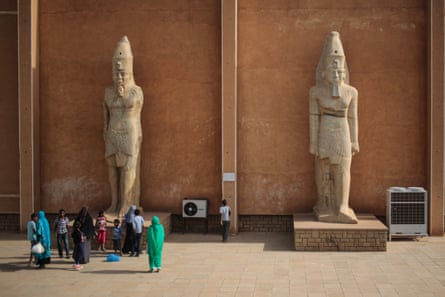New images reveal extent of looting at Sudan's national museum as rooms stripped of treasures
Only a few statues remain, with thousands of priceless artefacts from Nubian and Kushite kingdoms missing
Mon 31 Mar 2025 06.00 EDT
Last modified on Mon 31 Mar 2025 06.03 EDTVideos of Sudan's national museum showing empty rooms, piles of rubble and broken artefacts posted on social media after the Sudanese army recaptured the area from the paramilitary Rapid Support Forces (RSF) in recent days show the extent of looting of the country's antiquities.
Fears of looting in the museum were first raised in June 2023 and a year later satellite images emerged of trucks loaded with artefacts leaving the building, according to museum officials. But last week, as the RSF were driven out of Khartoum after two years of war, the full extent of the theft became apparent.

A video shared by the Sudan Tribune newspaper showed the museum stripped bare, with only a few large statues remaining, including the seven-tonne statue of King Taharqa, a pharaoh who ruled Egypt and Kush (present-day Sudan) from 690 to 664BC. Others showed ransacked rooms and smashed display cabinets.
The museum held an estimated 100,000 artefacts from thousands of years of the country's history, including the Nubian kingdom, the Kushite empire and through to the Christian and Islamic eras. It held mummies dating from 2500BC, making them among the oldest and archaeologically most important in the world.

Elnzeer Tirab Abaker Haroun, a curator at the Ethnographic Museum in Khartoum, said a specialist team visited the site after the RSF were expelled to assess the damage, which they will be documenting in a report.
"The tragedy was immense," he said. "Most of the museum's rare artefacts, as well as its precious gold and precious stones, have been lost."
The theft includes not only items on public display but those held inside a fortified room, including gold, which it is feared have been smuggled out of the country for sale abroad.
Unesco, the UN's cultural agency, has previously called on art dealers not to trade, import or export artefacts smuggled out of Sudan.
The scale of the damage to the museum and Sudan's heritage has been felt deeply by Sudanese.
"Seeing the Sudan National Museum being looted and destroyed by RSF was one of the most painful crimes … I felt ashamed and angry," said Hala al-Karib, a prominent Sudanese women's rights activist.
As a student, Karib and her friends would walk through the building admiring the artefacts from ancient kingdoms and jokingly posing as if they were themselves the queens depicted.

She first started visiting the museum with her father and, when she became a parent herself, took her own daughter there almost weekly.
"It was very personal; we are proud people and continually inspired by our ancient civilisation – it is the heritage we pass on to our children and grandchildren."
Many view it as a tragedy emblematic of the loss the country has suffered since the war started in 2023 during a power struggle between the army commander, Abdel Fattah al-Burhan, and the RSF's leader, Mohamed Hamdan Dagolo
Shahenda Suliman, a Sudanese trade unionist, said: "Whilst the human tragedy of this war outweighs everything for me, there's a symbolism there in seeing emptiness where these grand objects once stood that sort of captures the scale of destruction, loss and emptying of the country that we've seen since the war started.
"There are artefacts that have survived every plague, invasion and occupation for millennia, and predate the birth of Christ, that didn't survive this war."

Dallia Mohamed Abdelmoniem, a former journalist displaced from Khartoum by the war, said the loss of the museum's heritage was especially significant as an appreciation of Sudan's ancient history has become more widespread only recently.
She highlighted how the term Kandaka – a title for queens from the ancient kingdom of Kush – was used to describe female activists who participated in the 2018 protest movement that ousted the dictator Omar al-Bashir.
"I don't know how we'll be able to replace these priceless historical artefacts – and if there's a will to do so," said Abdelmoniem.
"The majority of Sudanese have been adversely affected on so many levels by this war, the restoration and return of items of historical, cultural and ancient significance I fear may not be viewed as a priority."
Why you can rely on the Guardian not to bow to Trump – or anyone
I hope you appreciated this article. Before you move on, I wanted to ask whether you could support the Guardian's journalism as we face the unprecedented challenges of covering the second Trump administration.
As Trump himself observed: "The first term, everybody was fighting me. In this term, everybody wants to be my friend."
He's not entirely wrong. All around us, media organizations have begun to capitulate. First, two news outlets pulled election endorsements at the behest of their billionaire owners. Next, prominent reporters bent the knee at Mar-a-Lago. And then a major network – ABC News – rolled over in response to Trump's legal challenges and agreed to a $16m million settlement in his favor.
The Guardian is clear: we have no interest in being Donald Trump's – or any politician's – friend. Our allegiance as independent journalists is not to those in power but to the public. Whatever happens in the coming months and years, you can rely on the Guardian never to bow down to power, nor back down from truth.
How are we able to stand firm in the face of intimidation and threats? As journalists say: follow the money. The Guardian has neither a self-interested billionaire owner nor profit-seeking corporate henchmen pressuring us to appease the rich and powerful. We are funded by our readers and owned by the Scott Trust – whose only financial obligation is to preserve our journalistic mission in perpetuity.
What's more, we make our fearless, fiercely independent journalism free to all, with no paywall – so that everyone in the US can have access to responsible, fact-based news.
With the new administration boasting about its desire to punish journalists, and Trump and his allies already pursuing lawsuits against newspapers whose stories they don't like, it has never been more urgent, or more perilous, to pursue fair, accurate reporting. Can you support the Guardian today?
We value whatever you can spare, but a recurring contribution makes the most impact, enabling greater investment in our most crucial, fearless journalism. As our thanks to you, we can offer you some great benefits – including seeing far fewer fundraising messages like this. We've made it very quick to set up, so we hope you'll consider it. Thank you.
Betsy Reed
Editor, Guardian US

-- Sent from my Linux system.

Wow! 핸디캡 토토사이트
ReplyDeleteSuch an amazing and helpful post this is. 토토 베팅
Whereas an unmanaged dedicated server is one which is managed by the company needing the server, without the help of the
ReplyDeleteThanks for sharing
ReplyDeleteTook me time to read all the comments, but I really enjoyed the article
ReplyDelete